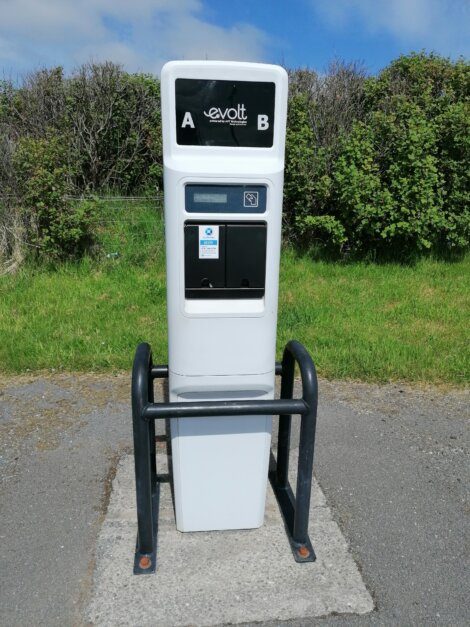Transport / NorthLink assessing risks of electric vehicle chargers on ferries
Green councillor Alex Armitage believes chargers on the overnight sailing would be a good move – but there are concerns it would be counter-intuitive
A LOCAL Green councillor says the idea of installing electric vehicle chargers on the NorthLink ferries would be a “step in the right direction”.
Alex Armitage, who represents Shetland South, said it would make life more convenient for the growing number of electric vehicle drivers.
A spokesperson for Serco NorthLink Ferries said that following recent guidance from the Maritime and Coastguard Agency (MCA), it is “assessing the risks associated with the fitment and use of EV charging onboard to inform decision making”.
But warnings have been made that having points on board may defeat the purpose due to the emissions of the ferries themselves, which could likely power the chargers.
While there are currently no charging facilities on board, the company has a charger at its Aberdeen terminal which is reserved for staff and passengers.
The idea of charging while at sea has re-emerged thanks to pressure from Electric Vehicle Association Scotland, which counts Orkney Renewable Energy Forum chairman Neil Kermode as a member.
He said there has been a campaign to get chargers on the NorthLink ferries for the last four years.
The ferry journeys from Aberdeen to Shetland are overnight, while the stop-offs in Orkney arrive late at night.
The thinking is that electric vehicles could potentially be charged on the car deck of the boat, where they would be sitting stationary anyway.
However, the chargers would effectively be powered by marine fuel, and as it stands the NorthLink boats are big polluters.
When asked about the idea during a visit to Shetland last week, Scottish transport minister Jenny Gilruth said it was not something she was aware of but said it was a “pretty reasonable suggestion”.
Meanwhile Green councillor Armitage generally welcomed the idea, saying it would benefit both local people and also visitors with electric vehicles.
Become a member of Shetland News
“Whilst I believe that the future of transportation in Shetland will involve significantly more public transport and active travel, there will be a continuing need for private cars, so we need to transition as quickly as possible away from petrol and diesel vehicles to electric,” he said. “So this is a step in the right direction.”
The councillor said, however, that it is more important to make the transition away from internal combustion engines, adding that the lifeline NorthLink service will “eventually be fuelled by green hydrogen or green hydrogen derivatives”.
“For me the key thing is to start work now on getting in place the systems and infrastructure that we need for a zero carbon future,” Armitage said.
Electric car user Gary Robinson feels chargers on board it would be counter intuitive due to the emissions of the ferries and said NorthLink have bigger priorities at the moment.
“My Nissan Leaf is one of the older generation of EVs [electric vehicles] with a range a little over 100 miles, but even so, I could easily plan my journeys without the need to charge on the ferry,” he said.
“As the range of EVs continues to improve; many have a range between 200 and 300 miles now, and with some over 300 miles, the need for frequent topping up is diminishing all the time.”
Robinson added that “as well as being bad for the environment, it would also be extra faff for loading and unloading the ferries as the EVs would have to be loaded and parked close to charging point”.
“If this ends up anywhere close to the top of NorthLink’s priority list, then I’d seriously question their thinking,” he continued.
The new guidance from the MCA in question is ‘MGN653’, which was published in July and has fire safety at its core.
It provides the UK shipping industry with “best practice guidance to facilitate safe carriage, and potential charging of, electric vehicles onboard roll-on roll-off (ro-ro) passenger ferries”.
The guidance said there are few requirements specific to the charging of electric vehicles onboard UK vessels in place at the moment.
“However, noting the increasing popularity of the electric vehicle, it has become apparent that there is a potential for both the users of these vehicles and the operators of vessels to charge vehicles onboard,” it added.
“Charging should be from dedicated charging stations and offered at the discretion of the ships’ master.
“The limited capacity for charging on board and the charging fuel source of the ro-ro ferry, normally marine fuel oil, should be considered when making decisions on charging of electric vehicles, and may partly negate the environmental benefits of electric vehicles.
“Charging operations in the port before and/or after the sea journey may be more efficient, environmentally friendly, cost effective and have a lower risk profile than charging onboard, even if that would be more convenient for the vehicle owners.”
A spokesperson for the MCA said there have never been any MCA-mandated restrictions on allowing electric charging points for vehicles onboard ferries.
“The publication of MGN653 has introduced guidance on how to do it safely, as ferry operators may wish to consider the installation of EV chargers onboard vessels and offering charging options to passengers,” they said.
“The notice goes beyond the question of charging and looks at the overall fire safety of electric vehicles on passenger ro-ro ferries.”
Become a member of Shetland News
Shetland News is asking its many readers to consider paying for membership to get additional features and services: -
- Remove non-local ads;
- Bookmark posts to read later;
- Exclusive curated weekly newsletter;
- Hide membership messages;
- Comments open for discussion.
If you appreciate what we do and feel strongly about impartial local journalism, then please become a member of Shetland News by either making a single payment, or setting up a monthly, quarterly or yearly subscription.






































































